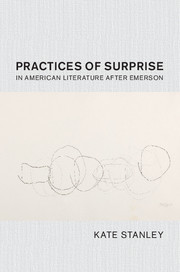Description
Practices of Surprise in American Literature After Emerson
Cambridge Studies in American Literature and Culture Series
Author: Stanley Kate
This book establishes surprise as a key Emersonian affect, and demonstrates its significance for transatlantic modernism and the philosophy of pragmatism.
Language: EnglishApproximative price 107.80 €
In Print (Delivery period: 14 days).
Add to cart
Publication date: 07-2018
254 p. · 15.7x23.5 cm · Hardback
254 p. · 15.7x23.5 cm · Hardback
Description
/li>Contents
/li>Biography
/li>
Practices of Surprise in American Literature After Emerson locates a paradoxical question - how does one prepare to be surprised? - at the heart of several major modernist texts. Arguing that this paradox of perception gives rise to an American literary methodology, this book dramatically reframes how practices of reading and writing evolved among modernist authors after Emerson. Whereas Walter Benjamin defines modernity as a 'series of shocks' inflicted from without, Emerson offers a countervailing optic that regards life as a 'series of surprises' unfolding from within. While Benjaminian shock elicits intimidation and defensiveness, Emersonian surprise fosters states of responsiveness and spontaneity whereby unexpected encounters become generative rather than enervating. As a study of how such states of responsiveness were cultivated by a post-Emerson tradition of writers and thinkers, this project displaces longstanding models of modernist perception defined by shock's passive duress, and proposes alternate models of reception that proceed from the active practice of surprise.
Introduction: through Emerson's eye; 1. Proust's perceptual training; 2. Henry James's syntax of surprise; 3. Nella Larsen's novel weather; 4. Gertrude Stein's grammars of attention; Coda: surprised by silence (listening with Cage).
Kate Stanley is Assistant Professor of English at the University of Western Ontario. She received her Ph.D. from Columbia University in 2013. Her contributions to the study of American literature, modernism, pragmatism, and pedagogy have appeared or are forthcoming in Modernism/modernity, American Literary History, Criticism, Henry James Review, and Women's Studies Quarterly.
© 2024 LAVOISIER S.A.S.
These books may interest you

Ralph Waldo Emerson in Context 107.80 €

Emerson's Literary Philosophy 105.49 €



